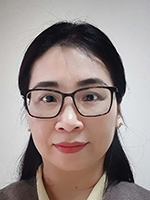Group Invitation Program for Next Generation Experts in ASEAN(Cohort1: Economic Securities)Le Phuong Hoa

Le Phuong Hoa(Vietnam)
Deputy Director General, Institute for Southeast Asian Studies (ISEAS), Vietnam Academy of Social Sciences (VASS)
Final Report
In Vietnam, recognizing the risks, challenges and threats to the economy in the context of a market economy and international integration, the Vietnam Communist Party and State have always paid attention to ensuring economic security. There are many policies and regulations that referred to, such as cyber security, economic crime. However, there is not Economic Security law as Japan. Economic Security Bureau was established in 2018 under Ministry of public security. The Bureau handle complex issues of financial security, currency, investment, energy security...
After 5 working days with experts, government officials and businesses, I have gained a lot of interesting knowledge about economic security.
First of all, I would like to mention about the definition of economic security. I think many countries are talking about economic security, but each country has its own definition depending on different circumstances. Japan has a concept of economic security, but in Vietnam, there is not really a legalized concept. This is a point that we will promote and will learn from Japan and make it fit with our context. From my point of view, economic security has three aspects. First, economic security is ensuring the continuity and stability of domestic economic activities - avoiding disruption due to another country's hostile economic policy or an extraordinary incident (such as the Covid-19 pandemic paralyzing production and supply of goods). Second, economic security is protecting the sovereignty and independence of one's policies - especially foreign policy - from being affected by economic threats from another country. Third, economic security is about protecting national security if economic development - especially advanced industries such as semiconductors - has the potential to change the military balance of power (such as between the US and China).
I also pay attention to the aspects that need to be considered when building economic security policies. In Japan, as I learned from Professor Igata, there are two main factors when making economic security laws: the Chinese factor and the technological factor. However, in the context of Vietnam, perhaps we have to consider more than these two factors.
Regarding the pillars or contents of economic security policy, Japan has proposed four groups. For Vietnam, there may be some differences. For example, Japan's semiconductor industry is already the world's leading while Vietnam is just at the starting point. We will have to research and choose which economic sectors have a direct impact on security.
I also share Japan's current approach to economic security diplomacy (that I learn from official of Ministry of Foreign Affair) Japan pay attention to maintain the current world order. We are living in an unstable political and security environment, which is harmful to the peace and prosperity of each country. From my perspective, world order needs to be based on rules.
The sharing from Ministries, JBIC and JICA is also very interesting, providing useful information about Japan's foreign economic orientation. I am planning to write a report or paper with the topic: Japan's economic security policy and recommendations for Vietnam.
Thank Japan Foundation to give me the chance to learn a lot via the Program.
- What We Do Top
- Arts and Cultural Exchange [Culture]
- Japanese-Language Education Overseas [Language]
- Japanese-Language Education Overseas [Language] Top
- Learn Japanese-language
- Teach Japanese-language
- Take Japanese-Language Test
- Know about Japanese-language education abroad
- The Japanese-Language Institute, Urawa
- The Japanese-Language Institute, Kansai
- Japanese-Language Programs for Foreign Specified Skilled Worker Candidates
- Japanese Language Education for Japanese Children Resident Overseas and for the Descendants of Migrants
- Archives
- Japanese Studies and Global Partnerships [Dialogue]
- JF digital collection
- Other Programs / Programs to Commemorate Exchange Year
- Awards and Prizes
- Publications
